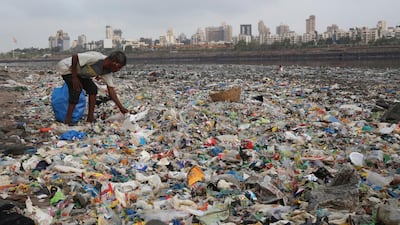Half of UAE residents want to see an outright ban on disposable coffee cups, foam egg boxes and plastic bags to help tackle the planet’s escalating problem with plastic.
A survey conducted by YouGov of 1,017 residents revealed widespread concern about single-use plastics. Fifty-two per cent of respondents said they were "greatly concerned" about the use of plastic, with the greatest worry expressed by people who live in Dubai and Abu Dhabi.
Almost two thirds say excessive plastic waste is leading to environmental degradation.
Two out of five respondents said they were aware of government efforts to discourage plastic use. Recent legislation includes a federal law aimed at recycling 75 per cent of waste.
The UAE’s waste generation per capita is about 1.3 kilograms a day, which is among the world’s highest. About three quarters of that ends up in landfills, according to figures released by the Ministry of Climate Change and the Environment in May.
The YouGov survey found that people aged 40 and older were the most worried about the effects of plastic. Sixty-one per cent of them reported concerns about the use of plastic in their cities, while more than three quarters said they were worried about the impact of plastic on the planet — more than the younger generations.
People between age 30 to 34 reuse plastic more than any other age bracket at 81 per cent, according to the survey. Those between 25 and 29 reuse plastic the least at 72 per cent.
The vast majority of respondents, 83 per cent, said reducing plastic use was the best way to protect the environment. More than half of them also said carrying a bottle to refill water and not using disposable plastic cutlery was key.
Respondents said they would support a ban on a range of plastic items, particularly disposable coffee cups, foam egg boxes, drinking straws, wet wipes and plastic bags.
Plastic cutlery and excess packaging for takeaway food was flagged as one of the biggest concerns in a discussion on the topic on the Plastic Free UAE Facebook page, where members share tips on how to reduce its use.
“The plastic cutlery, the additional box for the burger ... it's really tragic to see it just thrown away,” wrote a member of the closed group, Hazeena Joshi, 32, from Singapore.
________________
Read more:
Waitrose Abu Dhabi trial sees 75% reduction in single-use plastic bags
UAE company designs huge plastic barrier to tackle waste in oceans
Researchers accidentally create plastic-eating enzyme
________________
Amanda Lonsdale, 44, from the UK, said: “There needs to be a plastic bag ban in place.
“Use paper bags or encourage customers to bring their own reusable bags. I’ve been using LuLu reusable shopping bags for 10 years. I think they cost me Dh10 each. Not one has broken yet.”
Group member Gemma Daly, 33, from the UK, said helpers at checkouts in supermarkets packing one item into each bag was a major issue.
“It’s a good shock to the system when I head back the UK and see the progress they’ve made to reduce plastic bag use in supermarkets,” Ms Daly said.
She uses her own bags and said she got weird looks every time.
“I mainly shop in Kibsons where they provide paper wrapping for fruit and vegetables,” Ms Daly said.
Other businesses across the UAE are also starting to take a stand against plastic.
In June, Waitrose imposed a Dh0.25 charge for each single-use plastic bag in its Abu Dhabi stores, with all proceeds to be donated to Emirates Wildlife Society. The trial resulted in a 74 per cent reduction of plastic use.
In July, the Royal Orchid Group of restaurants stopped providing plastic cutlery along with takeaway orders unless specifically requested.
“It took a while for customers to accept this but eventually everyone co-operated,” said Anisha Sharma, the group’s marketing director.
“We aim to slowly but surely cut down on the use of plastic but sometimes it is hard to find alternatives.”
Royal Orchid has also reduced the amount of plastic used in packaging and transport of food.
“Staff are made aware and educated in the subject. They are small steps but in the right direction,” Ms Sharma said.


